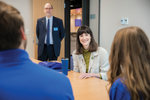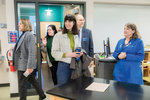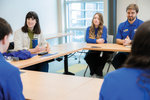


Late last month, in her first visit back to the 3rd Congressional District after being sworn in as a U.S. representative, Marie Gluesenkamp Perez, D-Washougal, visited Clark and Centralia colleges, two of Southwest Washington’s largest community colleges.
In Clark College’s “State of the College” address on Jan. 19, President Karin Edwards said the faculty’s goal for the year is to continue “rethinking and redesigning” the educational process as enrollment numbers bounce back from the COVID-19 pandemic.
“When we invest in students, we invest in the next generation of leaders, and I was inspired and encouraged by Dr. Edwards’ vision for Clark College during her State of the College address,” Gluesenkamp Perez said. “I look forward to partnering with Dr. Edwards and the entire Clark College team to make sure the college can continue to provide students with a foundation for a successful future in any field, including in the trades.”
The following day, the new representative and her team toured Centralia College, visiting its diesel engineering program administrators and student government. Gluesenkamp Perez, 35, reflected on her days in community college and her time spent on the Mount Hood Community College Automobile Advisory Committee. Streamlining the FAFSA process was among the congressional priorities discussed between her, students and administration in Centralia.
President Bob Mohrbacher at Centralia College said anything Gluesenkamp Perez could do to make community college more accessible would benefit both the students of Southwest Washington and its economy. Besides the WSU satellite campus in Vancouver, the district, which covers Lewis, Clark, Cowlitz, Pacific, Wahkiakum, Skamania counties and part of Thurston, has only community colleges and no universities.
“We think it’s the most important sector of education,” Mohrbacher said.
Gluesenkamp Perez told The Reflector her week had been filled with introductions to “servant leaders” and said her new understanding of the local schools instilled a new “sense of urgency, in protecting the good things that are happening here.”